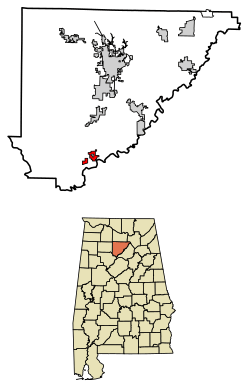Colony, Alabama facts for kids
Quick facts for kids
Colony, Alabama
|
|
|---|---|
|
Town
|
|

Location of Colony in Cullman County, Alabama.
|
|
| Country | United States |
| State | Alabama |
| County | Cullman |
| Area | |
| • Total | 2.17 sq mi (5.63 km2) |
| • Land | 2.16 sq mi (5.60 km2) |
| • Water | 0.01 sq mi (0.02 km2) |
| Elevation | 456 ft (139 m) |
| Population
(2020)
|
|
| • Total | 264 |
| • Density | 122.00/sq mi (47.11/km2) |
| Time zone | UTC-6 (Central (CST)) |
| • Summer (DST) | UTC-5 (CDT) |
| FIPS code | 01-16684 |
| GNIS feature ID | 1669444 |
Colony is a small town located in Cullman County, Alabama, in the United States. In 2020, about 264 people lived there. Colony is known for being a historically African-American town. It was a safe place for African Americans in the southern United States a long time ago. The town officially became a town in 1981.
Contents
Where is Colony Located?
Colony is in the southern part of Cullman County. It's about one mile north of the Mulberry Fork of the Black Warrior River. You can find the town along Alabama State Route 91, which is about a mile west of Interstate 65.
The town covers an area of about 2.17 square miles (5.63 square kilometers). Only a very small part of this area is water.
The Story of Colony
Early Days After the Civil War
Colony likely started soon after the American Civil War ended. This was when slaves were freed, during a time called Reconstruction. It's believed that the first people to settle in Colony were formerly enslaved people from Baltimore, Alabama.
Colony is the only African American community in Cullman County. The county itself was founded in 1873. Colony was seen as a safe place for Black people. At that time, many other towns with mostly white populations were considered dangerous for Black people after dark. These were sometimes called 'sundown' towns.
The original settlers in Colony were given land as a way to make up for their time as slaves. Eventually, over 8,000 acres of land were used for farming.
Becoming an Official Town
In Colony's early days, it wasn't officially part of Cullman County. This was because the freed Black residents were not always welcomed. However, when coal mines started to open near Colony, leaders in Cullman County wanted to include the mines in the county for economic reasons. Because of this, they also had to add Colony.
Colony officially became a town in 1981. This happened when Earlene Johnson was the mayor. Every August, the town celebrates "Colony Day" to remember its history.
Who Lives in Colony?
Population Changes Over Time
The number of people living in Colony has changed over the years. Here's how the population has looked:
| Historical population | |||
|---|---|---|---|
| Census | Pop. | %± | |
| 1990 | 298 | — | |
| 2000 | 385 | 29.2% | |
| 2010 | 268 | −30.4% | |
| 2020 | 264 | −1.5% | |
| U.S. Decennial Census | |||
People in Colony (2020)
In 2020, there were 264 people living in Colony. These people lived in 188 households, and 123 of those were families.
Here's a look at the different groups of people living in Colony based on the 2020 census:
| Race | Number of People | Percentage |
|---|---|---|
| White (not Hispanic) | 31 | 11.74% |
| Black or African American (not Hispanic) | 220 | 83.33% |
| Native American | 1 | 0.38% |
| Asian | 1 | 0.38% |
| Other/Mixed | 8 | 3.03% |
| Hispanic or Latino | 3 | 1.14% |
Famous People from Colony
- James C. Fields: He was a member of the Alabama House of Representatives from 2008 to 2010. This is a group of people who make laws for the state of Alabama.
See also
 In Spanish: Colony (Alabama) para niños
In Spanish: Colony (Alabama) para niños
 | DeHart Hubbard |
 | Wilma Rudolph |
 | Jesse Owens |
 | Jackie Joyner-Kersee |
 | Major Taylor |

